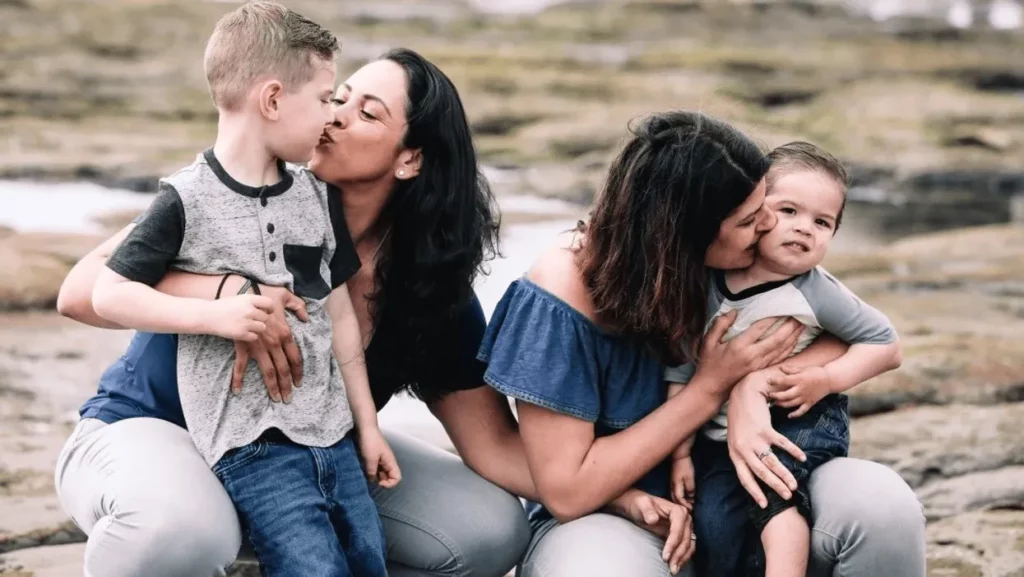Lesbian parenting shines as a unique facet, drawing a picture of motherhood that is painted with equal measures of love, resilience, and dedication. This blog aims to shed light on the journey of lesbian parenting, navigating through societal norms, dealing with unique challenges, and savoring the joyous moments of raising children together. Whether you’re part of a lesbian couple contemplating parenthood, a single lesbian mom eager for guidance, or an ally interested in understanding and supporting, this blog seeks to provide insights, advice, and stories to inform and inspire.
Contents
What Does Lesbian Parenting Define?
 Lesbian parenting refers to a family structure in which one or more children are raised by two mothers who identify as lesbians. Or by a single mother who identifies as a lesbian. This parenting structure can come to fruition in various ways. That might include adoption, foster parenting, surrogacy, artificial insemination, or through previous heterosexual relationships.
Lesbian parenting refers to a family structure in which one or more children are raised by two mothers who identify as lesbians. Or by a single mother who identifies as a lesbian. This parenting structure can come to fruition in various ways. That might include adoption, foster parenting, surrogacy, artificial insemination, or through previous heterosexual relationships.
Like any other form of parenting, lesbian parenting is defined by the love, commitment, and care the parents provide to their children. These parents face the same joys and challenges as heterosexual parents. And dealing with societal prejudices, legal barriers, and often, the lack of visibility and representation. It’s important to understand that lesbian parenting, much like all forms of parenting, does not follow a uniform pattern or strategy.
Each family is unique, with its own dynamics, values, and methods of child-rearing. The defining aspect of lesbian parenting is the presence of one or two mothers who identify as lesbian. And navigating the journey of parenthood together.
What Are The Issues In Lesbian Parenting?
Lesbian parents face many of the same challenges that all parents face. However, they also encounter unique challenges that are a result of societal prejudices and other issues tied to their sexual orientation. Here are some of these issues in lesbian parenting:
Legal Issues
Laws related to parental rights vary widely from place to place. In some countries and states, both lesbian parents can be easily recognized as the legal parents of their children. Whether the children were adopted or conceived through assisted reproductive technology. In other locations, the non-biological mother may have to go through lengthy and expensive legal processes to be recognized as a legal parent. Even in places with favorable laws, lesbian parents often need to consult with legal professionals. This is to ensure all their rights are protected, adding to the financial and emotional burden of parenting. The variability in legal recognition also poses issues during international travel or relocation, as a parent legally recognized in one jurisdiction may not be so in another.
Discrimination and Stigma
Despite societal progress, discrimination and stigma against same-sex couples persist. Lesbian parents may face negative attitudes from neighbors, colleagues, teachers, religious communities, and even healthcare providers. This discrimination can take the form of passive prejudice, outright hostility, or even exclusion from certain activities or communities. It can cause significant stress and social isolation, and can also impact the children in these families.
Family Acceptance
Acceptance of sexual orientation varies among families. Some lesbian parents receive love and support from their families of origin, but others may face denial, rejection, or attempts to change their sexual orientation. This can lead to painful decisions about limiting contact with family members or even complete estrangement. Children may be confused or hurt by the lack of relationship with grandparents, aunts, uncles, or cousins who do not accept their parents’ orientation.
 Children in lesbian families grow up in a society where most families are headed by heterosexual parents. They may have questions about why their family is different and may struggle with feelings of difference or exclusion. Parents can help by maintaining open communication and providing age-appropriate information about sexual orientation. And connecting their children with other families like theirs. Despite these challenges, research shows that children raised in same-sex households fare just as well as their counterparts in heterosexual households in their psychological, social, and emotional well-being.
Children in lesbian families grow up in a society where most families are headed by heterosexual parents. They may have questions about why their family is different and may struggle with feelings of difference or exclusion. Parents can help by maintaining open communication and providing age-appropriate information about sexual orientation. And connecting their children with other families like theirs. Despite these challenges, research shows that children raised in same-sex households fare just as well as their counterparts in heterosexual households in their psychological, social, and emotional well-being.
Access to Parenting Resources
Most parenting resources assume a heterosexual family structure. Parenting books, websites, and classes often provide advice based on the dynamics of a family with a mother and a father. Lesbian parents may find it challenging to find resources that reflect their experiences or offer relevant advice. Additionally, many support systems and social groups for parents may not be welcoming or inclusive of lesbian parents. This makes it difficult to find support and community.
Healthcare Discrimination
Access to compassionate and competent healthcare is a right everyone should enjoy. But, unfortunately, discrimination in this sector can present significant challenges for lesbian parents. Some healthcare providers may hold biases or lack knowledge about the specific health needs and concerns of the LGBTQ+ community. Lesbian mothers may find themselves having to ‘come out’ repeatedly to different healthcare providers. That can be stressful and intimidating. They might also encounter providers who make heteronormative assumptions about their family structure or who are judgmental about their sexual orientation. This can lead to uncomfortable or even damaging healthcare experiences.
Co-parenting challenges
Co-parenting, or sharing the duties of raising a child, is often a complex task regardless of the parent’s sexual orientation. However, for lesbian parenting, there can be unique challenges. Particularly if the child was conceived using assisted reproductive technologies. For instance, the parent who is not biologically related to the child may feel left out or less bonded, especially in the early days. Alternatively, the biological mother may struggle with feelings of greater responsibility or ownership.
Remember, these are potential issues and challenges. They do not necessarily apply to every lesbian parent or family. And many lesbian parents successfully navigate these issues to create loving, supportive family environments for their children.
How To Overcome Lesbian Parenting Issues?
 Addressing and overcoming the unique challenges that come with lesbian parenting requires a multifaceted approach. Here are some strategies that can help:
Addressing and overcoming the unique challenges that come with lesbian parenting requires a multifaceted approach. Here are some strategies that can help:
- Legal Guidance
It’s crucial for lesbian parents to seek advice from lawyers who specialize in LGBTQ+ family law. These professionals can help navigate adoption, artificial insemination, or surrogacy laws. And can provide guidance on securing legal parental rights for both parents.
- Support Networks
Building a strong community of supportive friends, family, and other parents can help combat feelings of isolation or discrimination. Joining local or online groups specifically for LGBTQ+ parents can provide a safe space to share experiences, advice, and resources.
- Education
Take the initiative to educate those around you about your family structure to help break down stereotypes and misconceptions. This could be as simple as explaining your family setup to your child’s school teacher. Or having an open conversation with a curious neighbor.
- Open Communication
It’s essential to have open and age-appropriate conversations with your children about their family structure. This can help them understand their family, and cope with any questions or discrimination they might face. And build a strong sense of self-esteem.
- Seek LGBTQ+ Friendly Healthcare Providers
Search for healthcare providers who are known for being LGBTQ+ friendly and have experience with or training in the unique health considerations of the LGBTQ+ community. It’s important to have healthcare providers who respect and understand your family.
- Therapy and Counseling
If co-parenting challenges arise, seek help from therapists or counselors who have experience working with LGBTQ+ families. They can provide valuable guidance and tools to navigate these issues.
- Self-Care
Last but not least, it’s important for lesbian parents to take care of their mental health. Facing discrimination or navigating legal challenges can be stressful, and it’s important to take time for self-care and relaxation.
Remember that every family is unique, and what works for one family might not work for another. The ultimate goal is to create a loving and supportive environment for children to grow and thrive.
Conclusion
Embarking on the journey of lesbian parenting is a testament to courage, resilience, and boundless love. It’s about navigating through societal norms, carving out spaces in places where representation is often limited. And fostering a loving family environment despite the unique challenges that might arise. Through supportive communities, legal guidance, and open communication, lesbian parents continue to overcome barriers. And redefine the societal norms of parenthood.
Let’s embrace this journey, celebrate its joys, and learn from its challenges. And above all, let’s continue to respect and cherish the diverse forms of love that hold families together. Life may sometimes be challenging if you are a lesbian, but Online Lesbian Counseling can help. Get experienced LGBTQ therapists at PrideMantra: Book a trial LGBTQ therapy session


